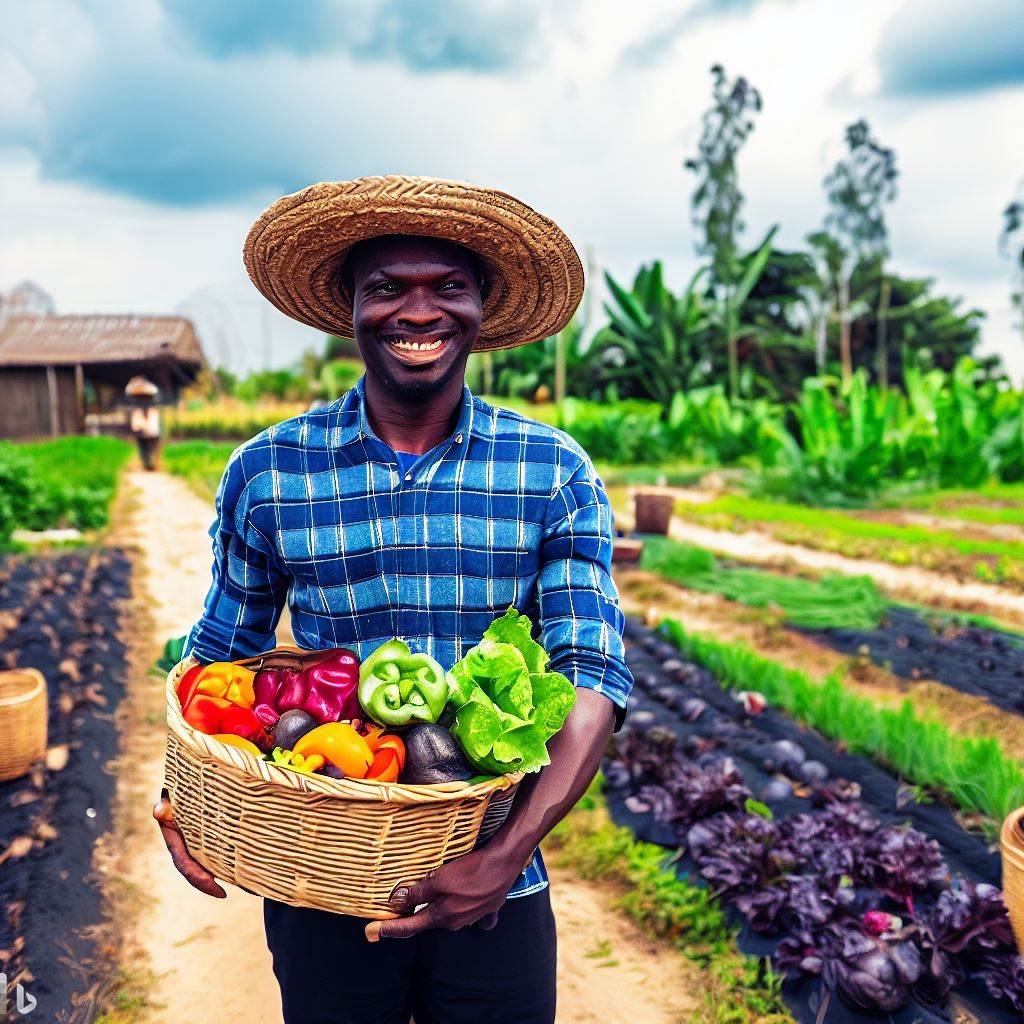Introduction
Livestock farming in Nigeria has a significant impact on the country’s economy and food security. This blog post aims to explore the opportunities and challenges faced in this sector.
Livestock farming in Nigeria is a vital sector with diverse opportunities and significant challenges that warrant exploration.
Purpose of the Blog Post
This article aims to provide insight into the dynamic world of livestock farming in Nigeria, highlighting its potential and the obstacles it faces.
Opportunities
- Growing Demand: Nigeria’s increasing population creates a higher demand for livestock products such as meat, milk, and eggs.
- Export Prospects: The country’s abundant livestock resources offer opportunities for export to regional and global markets.
- Employment Generation: Livestock farming generates jobs across various stages of the value chain, from production to processing.
- Income Source: Engaging in livestock farming can serve as a stable income source for individuals and families.
Challenges
- Infrastructure Gaps: Inadequate transportation and storage facilities impede the efficient distribution of livestock products.
- Disease Risks: Frequent disease outbreaks pose threats to livestock health and farmers’ livelihoods.
- Land Limitations: Limited availability of suitable land hampers the expansion of livestock farms and contributes to overgrazing.
- Knowledge Gap: Lack of access to modern farming techniques and information affects productivity and efficiency.
Government Initiatives
- Policy Enhancement: Favorable policies can incentivize investments and promote sustainable practices within the sector.
- Research and Training: Government-sponsored research and training programs can enhance farmers’ skills and knowledge.
- Infrastructure Improvement: Developing better infrastructure, including roads and storage facilities, can enhance supply chain efficiency.
Livestock farming holds immense promise for Nigeria’s economy, offering opportunities for growth, employment, and food security. However, addressing challenges such as infrastructure, disease management, and knowledge gaps is essential for the sector’s long-term sustainability and success.
Overview of Livestock Farming in Nigeria
General Definition of Livestock Farming
Livestock farming refers to the rearing, breeding, and management of animals for various purposes such as food, labor, and economic gain.
Significance and Growth of Livestock Farming in Nigeria
Economic Importance
Livestock farming contributes significantly to Nigeria’s GDP and employment generation. It provides a source of income and livelihood for many rural households.
Export of livestock products like meat, milk, and hides contributes to foreign exchange earnings.
Food Security
Livestock farming plays a vital role in meeting the protein requirements of the Nigerian population. It ensures a steady supply of animal products like meat, eggs, milk, and fish, which are essential for a balanced diet.
Employment Opportunities
Livestock farming offers employment opportunities across the value chain. From farmers, herders, and butchers to veterinary doctors, technicians, and traders, it supports a wide range of jobs.
Poverty Alleviation
Livestock farming has the potential to uplift rural communities by reducing poverty levels. It provides an avenue for small-scale farmers to generate income and improve their standard of living.
Importance of Livestock Farming to the Agricultural Sector and Economy
Contribution to Agricultural GDP
Livestock farming plays a significant role in the overall agricultural sector, contributing a substantial share to the GDP. It complements crop farming and provides an integrated and diversified approach to agriculture.
Agricultural Value Chain
Livestock farming is an integral part of the agricultural value chain, supporting other sectors such as crop farming, processing, and marketing.
It creates linkages and synergies, enhancing the overall productivity and profitability of the agricultural sector.
Increased Agricultural Productivity
Livestock farming promotes sustainable agriculture by providing organic manure for crop production.
The integration of crops and livestock improves soil fertility, reduces pest infestation, and enhances overall farm productivity.
Export Potentials
Livestock farming, particularly the export of livestock products, contributes to increasing foreign exchange earnings.
Nigeria has the potential to tap into the global market for quality meat, dairy products, and leather goods, boosting export revenue.
livestock farming in Nigeria is essential for food security, employment generation, poverty alleviation, and overall economic growth.
Its contribution to the agricultural sector and the economy as a whole cannot be undermined.
By recognizing its significance and addressing the associated challenges, Nigeria can harness the immense opportunities offered by livestock farming.
Read: Exploring Top 10 Lucrative Agriculture Professions in Nigeria
Opportunities in Livestock Farming in Nigeria
Discuss the abundance of natural resources favorable for livestock farming in Nigeria
Nigeria is blessed with vast fertile lands and suitable climatic conditions for livestock farming. The availability of abundant water resources in the form of rivers, lakes, and ponds supports livestock farming.
Furthermore, Nigeria has a variety of grasslands and vegetation that provide natural grazing areas for livestock. The presence of mineral-rich soils contributes to the growth of nutritious pasture for livestock.
Examine the high demand for livestock products in the local and international market
Nigeria’s growing population and changing dietary preferences have increased the demand for livestock products. The local market demands various livestock products such as meat, milk, eggs, and hides for domestic consumption.
Internationally, Nigeria has the potential to export livestock products to meet the demand in global markets. There is a rising demand for Nigerian livestock products due to their quality and organic nature.
Explain the potential for job creation and income generation in the livestock sector
Livestock farming in Nigeria offers vast employment opportunities along the value chain. It provides jobs in areas such as animal rearing, veterinary services, feed production, and transportation.
The livestock sector also promotes entrepreneurship as individuals can start small-scale livestock farms. Increased income from livestock farming contributes to poverty reduction and economic growth.
Explore the possibilities of value addition and export in the livestock industry
Nigeria has the potential to develop a strong value addition industry for livestock products. Value addition can include processing meat into packaged products, milk into dairy products, and raw materials into finished goods.
Exporting value-added livestock products can generate foreign exchange and boost the economy.
Nigeria’s livestock industry can tap into international markets by meeting quality standards and certifications.
Read: Making a Living: Poultry Farming Careers in Nigeria

Challenges in Livestock Farming in Nigeria
Inadequate Infrastructure and Facilities for Livestock Farming
- Lack of proper roads, transportation systems, and storage facilities hinder the growth of livestock farming.
- Inadequate power supply affects the operation of farms, especially those with automated systems.
- Limited access to clean water sources poses a challenge for effective livestock farming.
- Insufficient research and development centers limit the availability of advanced farming technologies.
Lack of Access to Quality Inputs, Technologies, and Veterinary Services
- Farmers face difficulty in accessing quality feed, vaccines, and medications for livestock.
- Limited availability of modern farming equipment and machinery hampers productivity.
- Inadequate veterinary services make it challenging to control and prevent diseases among livestock.
- Lack of access to technical knowledge and training hinders the adoption of new farming techniques.
Insecurity and Conflicts Affecting Livestock Farming Activities
- Frequent cases of theft, rustling, and attacks on livestock by armed groups disrupt farming operations.
- Farmer-herder conflicts over grazing lands and water sources lead to loss of animals and livelihoods.
- Inadequate security measures in rural areas make farmers vulnerable to external threats.
Environmental Impact of Livestock Farming Practices and Sustainable Solutions
- Overgrazing of livestock contributes to land degradation and desertification in some regions.
- Improper waste management from large-scale farms pollutes water bodies and affects ecosystem balance.
- Greenhouse gas emissions from livestock farming contribute to climate change.
- Adopting sustainable farming practices like rotational grazing and waste recycling can mitigate environmental impacts.
Livestock farming in Nigeria faces several challenges including inadequate infrastructure, lack of access to quality inputs, insecurity and conflicts, and environmental impact.
Addressing these challenges through government intervention, investment in infrastructure, improved veterinary services, and sustainable farming practices will help unlock the full potential of livestock farming in Nigeria.
Read: Essential Guide to Crop Farming Jobs in Nigeria
Government Initiatives and Support for Livestock Farming
Overview of Government Programs and Policies Promoting Livestock Farming
The Nigerian government has implemented various programs and policies to promote the growth and development of livestock farming in the country. These initiatives aim to boost productivity, enhance food security, and create employment opportunities in the agricultural sector.
One such program is the National Livestock Transformation Plan (NLTP), which seeks to transform the livestock sector from a subsistence-based system to a commercially viable and economically sustainable industry.
The plan emphasizes the need for modernizing livestock production, improving breed quality, and promoting private sector investments.
Additionally, the government has established the Livestock Development Project (LDP) to provide technical assistance, capacity building, and extension services to livestock farmers. This project focuses on training farmers in modern farming techniques, disease control, and breed improvement.
Another significant policy is the Livestock Identification and Traceability System, which aims to enhance market access, ensure quality control, and mitigate the spread of animal diseases.
This traceability system helps to build consumer confidence and improves the overall value chain of livestock products.
Financial Incentives, Grants, and Loans Available for Aspiring Livestock Farmers
To encourage individuals to venture into livestock farming, the Nigerian government provides financial incentives, grants, and loans to support aspiring farmers.
These include the Agricultural Credit Guarantee Scheme Fund (ACGSF) and the Bank of Agriculture (BOA) loan programs.
The ACGSF provides guarantee cover for loans granted by commercial banks to livestock farmers, thereby reducing the financial risks associated with farming.
This scheme enables farmers to access credit facilities at affordable interest rates, facilitating their entry into the livestock sector.
Similarly, the BOA offers loans with favorable repayment terms to livestock farmers.
These loans cover various aspects of livestock farming, such as purchasing improved breeds, constructing housing facilities, and acquiring necessary equipment and machinery.
In addition to loans, the government also provides grants and subsidies to livestock farmers.
These grants can be utilized for capacity building, research and development, and infrastructure improvements, further assisting farmers in establishing and expanding their operations.
Government Efforts to Improve Infrastructure and Provide Necessary Facilities
Recognizing the importance of infrastructure in promoting livestock farming, the Nigerian government has made significant efforts to improve relevant facilities across the country.
The government has invested in the construction and rehabilitation of rural roads, which not only enhance access to livestock markets but also facilitate the transportation of feed, veterinary services, and other essential resources required by farmers.
Furthermore, the government has prioritized the establishment of agro-service centers and veterinary clinics in rural areas.
These facilities provide farmers with access to veterinary services, artificial insemination, vaccinations, and other necessary support, ultimately contributing to improved livestock productivity and health.
Collaboration with International Organizations to Enhance Livestock Farming in Nigeria
The Nigerian government has actively collaborated with international organizations to enhance livestock farming practices in the country.
These partnerships aim to leverage expertise, technologies, and funding to boost the overall growth and sustainability of the livestock sector.
One notable collaboration is with the Food and Agriculture Organization (FAO).
The FAO provides technical assistance, training programs, and research support to Nigerian livestock farmers, helping them adopt sustainable agricultural practices and improve productivity.
Additionally, Nigeria is part of the West Africa Livestock Innovation Hub (WALIHU), a collaboration between governments, research institutions, and development organizations.
WALIHU aims to enhance the resilience and productivity of livestock systems in West Africa through research, innovation, and knowledge-sharing.
The Nigerian government has implemented various initiatives to support livestock farming.
Through programs, policies, financial incentives, infrastructure improvements, and collaborations with international organizations, the government strives to create a conducive environment for aspiring livestock farmers and promote sustainable growth in the sector.
Read: Key Agricultural Professions: Boosting Nigeria’s Economy
Gain More Insights: Nigeria’s Agricultural Extension Services: Career Scope
Success Stories in Livestock Farming
Showcasing successful Nigerian livestock farmers’ achievements inspires and guides strategies to overcome industry challenges.
Nnamdi Okafor’s dedication and strategic breeding grew his cattle herd and income, displaying potential for profit.
Lola Adeleke’s poultry farm success with limited resources expanded by meeting customer demand, focusing on quality.
Abdul Ibrahim’s specialized goat farming earned success through market demand and tailored practices.
Ijebu community in Ogun State collaborated for large-scale pig farming, overcoming constraints through shared efforts.
Oluwaseun Adeboye’s cost-effective techniques maximized productivity despite limited equipment.
Edo Women’s Cooperative Society challenged gender roles, building a dairy business through perseverance. Lessons learned include resilience, innovation, networking, continuous learning, and government support.
To replicate success, build networks, stay updated with trends, learn continuously, embrace technology, and seek government support.
Success stories highlight resilience, innovation, networking, learning, and support as key factors for livestock farming success.
Conclusion
In this blog section, we have discussed the opportunities and challenges faced in livestock farming in Nigeria. The opportunities include a growing market, export potential, and government support.
However, challenges like infrastructure, disease outbreaks, and limited access to finance persist.
It is important for readers to consider the potential of livestock farming in Nigeria and contribute to its growth by investing in the sector and exploring innovative solutions.
The livestock farming sector in Nigeria presents a landscape of both promising opportunities and significant challenges. The growing demand for livestock products, export potential, and job creation highlight its potential to contribute to the nation’s economic growth.
However, infrastructure limitations, disease risks, and the need for improved knowledge dissemination are hurdles that must be overcome. Government support through policy enhancement, research, training, and infrastructure development is crucial to harnessing the sector’s full potential.
As Nigeria strives for food security and sustainable economic development, addressing these challenges will be key to ensuring the success of livestock farming and reaping its benefits for both farmers and the nation as a whole.
Together, we can drive its success and contribute to the overall agricultural development of the country.




